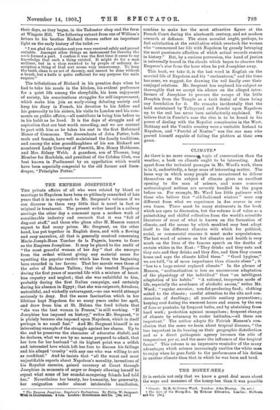CLIMATE.*
As there is no more comm* topic of conversation than the weather, a ,book on climate ought to be interesting. And apart from the technical passages in Mr. Ward's work, there is in it, undoubtedly, a large mass of interesting matter. The loose way in which many people are accustomed to deliver themselves on the subject of climate gives an excellent opening to the man of science, and some common meteorological notions are severely handled in the pages before us. For example, Mr. Ward has little patience with those who believe that "old-fashioned winters" were any different from what we experience in due course in our own times. There must be many statements in the book which are open to discussion, but the volume is of value as a painstaking and skilful collection from the world's scientific literature of most of what is known on the formation of climate, and the means by which mankind may best adapt itself to the different climates with which for political, social, or commercial reasons it must make acquaintanee. The last word of science on hot climates and health is very much on the lines of the famous speech on the 'deaths of certain whites in the East : " They drinks and they eats and they eats and they drinks and they dies, and then they comet; home and says the climate killed them." " Good hygiene," we are told, "is of more importance than climate alone " ; it "has to a large extent replaced climate." In the phrase of Manson, " acclimatisation is less an unconscious adaptation of the physiology of the individual " than " an intelligent adaptation of his habits." "A rational, temperate ,mode of life, especially the avoidance of alcoholic excess," writes Mr. Ward ; "regular .exeroise ; non-fat-producing food ; clothing suited to the climate ; careful attention to the site and con- struction of dwellings ; all possible sanitary precautions'; keeping cool during the warmest hours and season by the tteb of fans or punkahs, by frequent baths, and by abstaining from hard work ; protection against mosquitoes ; frequent 'change of climate by returning to cooler latitudes,—all these are important." The author adopts Sir Patrick Munson's con. elusion that the more we learn about tropical diseases, " the less important in its bearing on their geographic distribution and as a direct pathogenic agency becomes the role of temperature per se, and the more the influence of the tropical fauna." This volume is an impressive reminder of the many advantages which science increasingly enables the-white maw to enjoy when he goes forth to the performance of his duties in another climate than that in which he was born and bred.










































 Previous page
Previous page